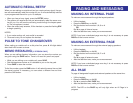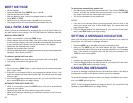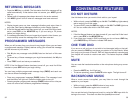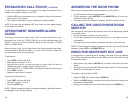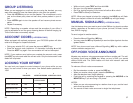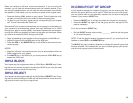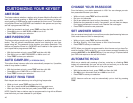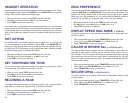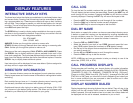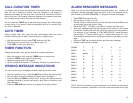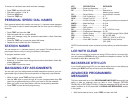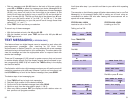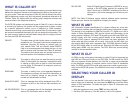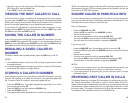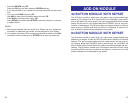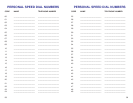
WHAT IS CALLER ID?
Caller ID is the name given to the telephone company-provided feature that
delivers the telephone number and sometimes the name of the person call-
ing your phone. There are two types of Caller ID; the first delivers the calling
party’s telephone number only and the second (sometimes referred to as
“Deluxe” Caller ID) delivers both the calling party’s telephone number and
name as listed in the telephone directory.
The iDCS 500 system can handle both types of Caller ID; in fact, in the case
of number only delivery, the system can be programmed to insert a name
for a specific telephone number (up to a maximum of 1500 numbers).
However, even though you are paying to receive Caller ID information, there
are some circumstances that mean you will not receive this information. The
six most common reasons are listed below along with the display informa-
tion that the iDCS 500 will provide.
PRIVATE The caller does not wish his/her name or number to be
revealed to you. This type of call can be stopped at the
telephone company by dialing an access code on
your outside lines. This will redirect these PRIVATE
calls to an announcement that states that you do not
wish to receive calls that have had Caller ID blocked.
The code to block these calls can usually be found in
the front section of the telephone directory.
OUT OF AREA The caller is calling from an area that cannot provide
Caller ID information (for example, international calls)
or he/she is calling from a type of circuit that cannot
provide Caller ID information, for example, some out-
bound WATS lines.
PAYPHONE The caller is calling from a coin-operated telephone.
The telephone company will send this information as
there are no directory listings for pay phones. The
number will be delivered as usual.
INVALID CID INFO This is a message that will be displayed when CID in-
formation is sent on the line but was somehow cor-
rupted.
NO CID RECEIVED This is a message that will be displayed when there
was no CID information sent on the line.
NO CID DSP Caller ID Digital Signal Processors (CIDDSP’s) are re-
sources in the DCS 400si required for receiving CID
data. If there are no CIDDSP’s available at the time a
call comes in, this is the message you will see on your
display.
NOTE: The Caller ID features require optional software and/or hardware.
Please see your service and installation company for details.
WHAT IS ANI?
ANI (Automatic Number Identification) is a feature offered by some tele-
phone service providers that provides the calling party’s telephone number.
This service is only available on E&M Tie Lines on a T1, digital trunk. ANI is
similar to Caller Identification (CID) but the format and information of the
calling person is different. CID uses FSK signalling and ANI uses DTMF sig-
nalling. Usually, with ANI, a calling party’s identity is the Listed Directory
Number (LDN) unless a separate bill-to-number has been specified, (in
which case the bill-to-number will be sent). Along with the ANI digits you
also receive DNIS digits with a separator digit. The DNIS digits are used to
tell the DCS 400si where to route the call. Note that ANI does not provide
calling party NAME, only the number. The DCS 400si can provide calling
number to name translation table.
WHAT IS CLI?
On ISDN circuits, calling party information is called CLI and is supported on
both BRI and PRI type circuits on the iDCS 500. On BRI circuits the iDCS
500 only supports number delivery and, like ANI, a name can be attached
to the telephone number of frequent callers via the Caller ID translation
table. On 5ESS and NI2 PRI circuits both name and number support is pro-
vided on the iDCS 500 system. On a DMS100 circuit only number service is
provided.
SELECTING YOUR CALLER ID
DISPLAY
You can decide if you want to see the CID number in the display. Regard-
less of which one is selected, you can press the NDD key to view the other
pieces of CID information. To select the type of Caller ID information you
wish to view first:
• With the handset on-hook, press TRSF and then dial 119.
• Dial 0 for CID options or 1 for ANI options, or 2 for CLI options.
5352



